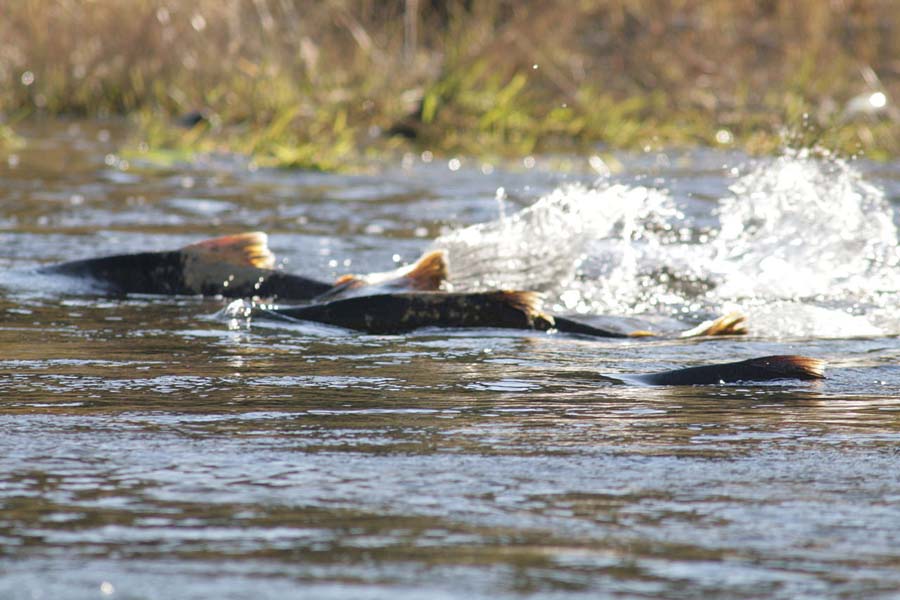
Chinook salmon on the Lower Tuolumne River in the Central Valley of California. The Chinook salmon (Oncorhynchus tshawytscha ) is an anadromous fish that is the largest species in the salmon family. Chinook salmon range from San Francisco Bay in California to north of the Bering Strait in Alaska, and the waters of Canada and Russia. They are highly valued, mostly due to their relative scarcity, compared to other salmon along the Pacific Coast. Nine populations are listed under the U.S. Endangered Species Act as either threatened or endangered, including the fall runs found in California’s Bay-Delta. Photo Dan Cook (USFWS). A public domain image.
Salmon fishing in California dates proposed for the year
The Mercury News / Staff Report / Bay Area News Group
SAN JOSE, California
On April 11, the Pacific Fishery Management Council proposed its salmon season for most of the Pacific coast.
In California, the commercial fishery consists of modest Chinook fisheries. Those between Horse Mountain and Pigeon Point (Fort Bragg and San Francisco areas) will be open for a week in late July, most of August and all of September.
From Pigeon Point to the Mexico border (Monterey), the Chinook season will be open during the first week in May and the last two weeks of June. There will also be a season from Point Reyes to Point San Pedro (subset of the San Francisco area) consisting of two five-day periods in October.
Recreational fisheries in the same areas will be open from mid-June through October. The area from Pigeon Point to the U.S./Mexico border (Monterey area) is open now through early July.
Patagonia vs. Donald Trump
by Rosecrans Baldwin / GQ Magazine
NEW YORK, New York
We all knew the legendary outerwear company Patagonia lived and breathed the adventurous life. We knew they cared about the environment. But it wasn’t till Trump came along that we realized they were ready to fight.
Patagonia was built in the image of its founder, Yvon Chouinard. In late January, when we met for the first time, that image included a flannel shirt, beat-up trousers, and flip-flops. Chouinard is an unlikely nominee for wealthiest man in the room. He walks with an air of deflection, as if to duck attention. “It’s funny, the first time I met him,” the celebrated mountain climber Tommy Caldwell told me, “I walked into the cafeteria at Patagonia, and I was like, ‘That guy looks like a homeless dude.’ ”
Chouinard is both a beatnik dropout and a renegade capitalist. A revolutionary rock climber in his day, who still disappears regularly to surf and fly-fish, he oversees a corporation that did $800 million in sales last year. At 79, Chouinard looks like a recovering mountain troll who enjoys sunshine, food, and wine but will probably outlast the rest of us if the apocalypse hits tomorrow. “I’ve spent enough time in the mountains,” he told me, “that I can get from point A to point B safely and efficiently. If shit hits the fan, I could feed my family off the coast. But I’m totally lost in the desert. I don’t understand the desert at all.”
In the months leading up to our meeting, Chouinard and Patagonia had seen a few disasters. The Thomas wildfire, the largest in California history, torched the hills around the company’s Ventura headquarters. Five employees lost their homes, and then came the mudslides. All of which took place while Patagonia dealt with a crisis back east: a decision by President Trump, the great un-doer, to shrink some of his predecessor’s national monuments. The pledge was a first for an American president; limiting the size of monuments like Bears Ears in Utah would mean the largest reduction of protected land in U.S. history. Which is what led Patagonia, in early December, to change its home page to a stark message: “The President Stole Your Land.”
In response, the U.S. House Committee on Natural Resources sent out an e-mail with the subject line “Patagonia: don’t buy it.” This wasn’t just Trump whining on Twitter that Nordstrom wasn’t supporting his daughter’s fashion line. The federal government, run by allegedly pro-business Republicans, basically called for the boycott of a privately held company—provoking a former director of the Office of Government Ethics to label the action “a bizarre and dangerous departure from civic norms.”
Chouinard has been known to be a prickly contrarian. He doesn’t do e-mail. His cell phone goes largely untouched. But he’s adept at delivering powerful sound bites. In December, Chouinard went on CNN—wearing what looked to be the same flannel shirt from the day we met—and said, “I think the only thing this administration understands is lawsuits. We’re losing this planet. We have an evil government.… And I’m not going to stand back and just let evil win.”
Which explains why Patagonia is presently suing the White House in federal court.
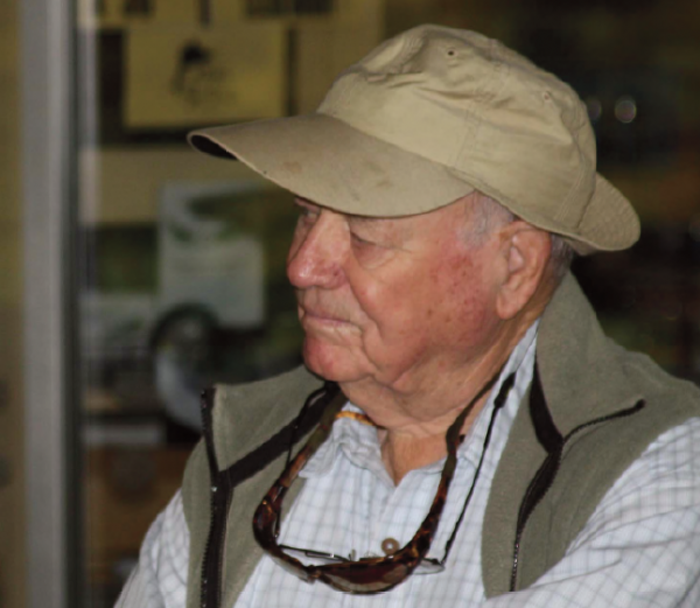
Inimitable Lefty Kreh, the father of modern day fly fishing. Skip Clement Photo.
Lefty Kreh: 1925-2018
by Matt Labash / The Weekly Standard
WASHINGTON, District of Columbia
Whenever I need to check out of the world, I head to a place called Satan’s Creek. I go there to catch-and-release?or maybe catch-and-ogle?God’s most perfect creatures: wild brook trout. They come small in these mountain runs. An 11-incher would be considered trophy-size. Still, bringing one to hand, with its speckled reds and yellows and blues, is like holding an opal with gills.
Satan’s Creek is not its real name, but I’ve so coined this riverine hideout because while fishing it, I often have to dodge the refuse left behind by Frederick County, Maryland, natives (“Frednecks” they’re sometimes called?though never to their faces). They don’t have the same reverence for the land as I do for their fish. I’ve circumnavigated cinch-sacked trash bags, animal ribcages (at least I think they were animals), a discarded toilet, and once even an abandoned suitcase with nothing in it but children’s panties, perhaps left over from the human sacrifices. And yet while I can catch brookies in more unspoiled climes, I still feel as though I’m fishing hallowed water. For Frederick was the birthplace and longtime stomping grounds of Bernard “Lefty” Kreh. And if it was good enough for Lefty . . .
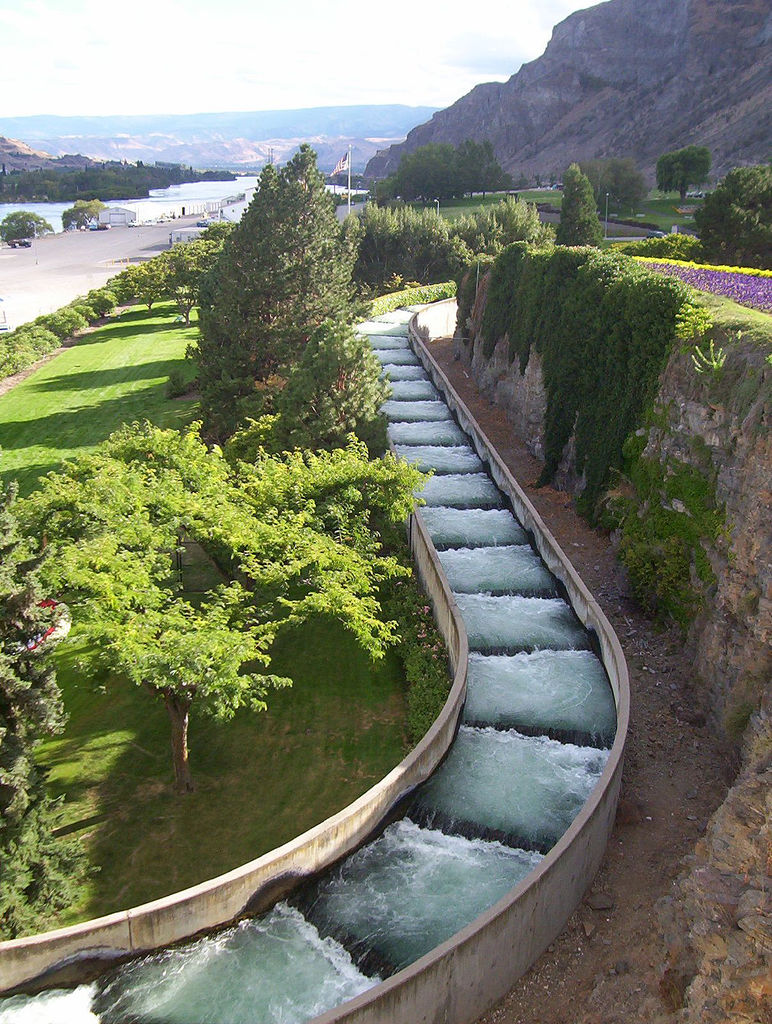
Salmon ladder at Rocky Reach Dam; Washington. Photot credit Garrett Fitzgerald – public domain image.
What’s the future of fishways? A fish passage expert argues that science needs to catch up with practice
by Ben Goldfarb / Hakai Magazine
VICTORIA, British Columbia
On the Columbia River, a 400-meter concrete ladder ushers salmon past the Bonneville Dam. On Germany’s Elbe, a chain of linked pools conveys trout, eels, and burbot. In Saskatchewan, fishways assist pike, walleye, and suckers beyond the Cowan Dam.
Yet despite centuries of progress, fishway failures still outnumber successes. On the Susquehanna, Merrimack, and Connecticut Rivers, biologists have found that fewer than three percent of shad reach their spawning grounds, despite the presence of fish ladders and elevators. In Sweden, subpar passages have been implicated in the decline of Atlantic salmon. A ladder at Thailand’s Pak Mun Dam excluded more than three quarters of the Mun River’s species, from spiny loaches to freshwater stingrays. Sometimes it’s hard to argue with nature writer John Hay, who in 1959 wrote that “there is no such thing, I have been told by men who were in the business of making them, as a good or even adequate fishway.”
IGFA World Record Game Fishes 2018 Edition Now Available
DANIA BEACH, Florida
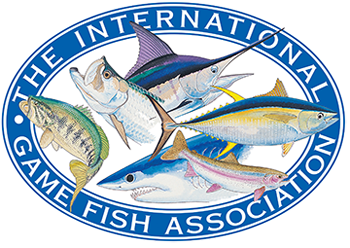 All the facts and figures behind recreational angling’s most amazing catches are now available in the 2018 edition of IGFA World Record Game Fishes published by The International Game Fish Association.
All the facts and figures behind recreational angling’s most amazing catches are now available in the 2018 edition of IGFA World Record Game Fishes published by The International Game Fish Association.
The IGFA World Record Game Fishes is the world’s definitive publication of recreational angling records. The 2018 edition includes comprehensive information on all freshwater, saltwater and fly-fishing world records for all-tackle, line classes and length-based catch and release records, including new world records set in the last year. In addition, the publication features a wide variety of unique content like Ten Fishing Tips & Techniques from IGFA Hall of Famer Bill Dance, tales of angler achievement like the Billfish Royal Slam on the Fly and stories around important conservation topics, including one titled Swordin’ for Science.
 The American Museum of Fly Fishing Celebrates 50th Anniversary on May 3rd
The American Museum of Fly Fishing Celebrates 50th Anniversary on May 3rd
MANCHESTER, Vermont
In preparation for the 1893 Chicago World’s Fair, Mary Orvis Marbury created wooden panels featuring flies and photographs to represent her father’s outdoor equipment retailer, C. F. Orvis Company. These panels were rediscovered in 1963 as Hermann Kessler was conducting research for Field and Stream magazine. He approached the new owner of Orvis, Leigh Perkins and in 1968 the American Museum of Fly Fishing was founded. Fifty years after this historic event, AMFF is now the world’s largest repository and conservator of angling related artifacts, including our 7,000 volume Gardner L. Grant Library.
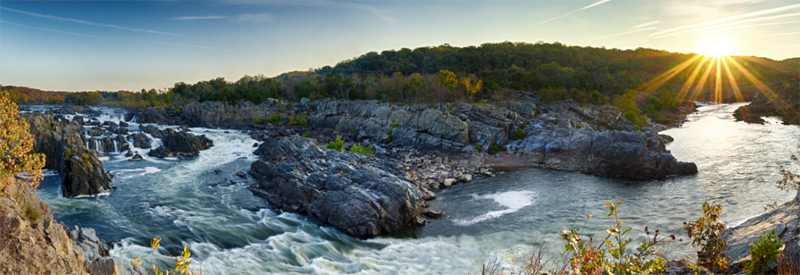
The Potomac River. Image credit Potomac Conservancy.org.
The Potomac River has earned its highest grade ever!
by Hedrick Belin, president / Potomac Conservancy, Inc.
SILVER SPRING, Maryland
In a dramatic turnaround for our region’s drinking water source, the Potomac’s health has improved from an abysmal D to a B in just ten years.
For the first time in generations, we are within reach of enjoying a healthy, thriving Potomac River. A river clean enough for anglers to eat their catch and safe enough for children to wade in. A river that supports verdant forests and abundant wildlife. Simply put, a river our hometown can take pride in.
It’s taken decades of hard work to strengthen water protections and undo the damage wrought by reckless polluters. We’re at a critical tipping point and there’s more work to be done.
Polluted runoff, rapid deforestation, and new attacks on water protections threaten to return dangerous pollution to local waters.
We’ve come too far to let progress go to waste!
The Potomac’s journey to an “A” will not be easy, but it’s worth fighting for because we all deserve a healthy river and clean water.


